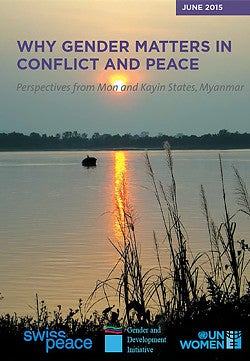
Why Gender Matters in Conflict and Peace: Perspectives from Mon and Kayin States

In Myanmar, as in many other parts of the world, politics, conflict and peace negotiations are considered “male domains.”
With some exceptions, women’s experiences of armed conflict and contributions to peace are largely unrecognized, undocumented and unaccounted for. But many women who have had distinct experiences of armed conflict are engaging within their communities in creative strategies to mitigate the impact of conflict, make and build enduring peace. However, these efforts are accorded little formal or other recognition by the Government, by ethnic armed organizations and society at large. Women and their priorities are consequently not adequately included in the country’s current peace processes.
This publication makes the argument that women’s equal participation with men in all aspects of the peace process and the inclusion of their priorities in the peace agenda would demonstrate the Government of Myanmar’s commitment to constitutional provisions of gender equality and women’s rights, and to international human rights frameworks, that it has endorsed. It would enhance the inclusiveness and sustainability of peace processes. Such a move would also signal responsiveness to calls for inclusion by gender equality and women’s empowerment advocates in Myanmar.